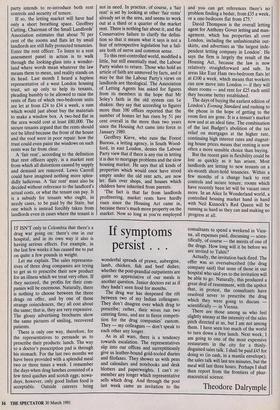If symptoms
persist . . .
IT ISN'T only in Colombia that there's a drug war going on: there's one in our hospital, and in its own way it also is having serious effects. For example, in the last few weeks it has caused me to put on quite a few pounds in weight. Let me explain. The sales representa- tives of three drug companies are trying to get us to prescribe their new product for an illness which we treat very often. If they succeed, the profits for their com- panies will be enormous. Naturally, there is nothing to choose between the three drugs on offer, and by one of those strange coincidences, they all cost about the same; that is, they are very expensive. The glossy advertising brochures show the same pictures of smiling, recovered patients. There is only one way, therefore, for the representatives to persuade us to prescribe their products: lunch. The way to a doctor's prescription pad is through his stomach. For the last two months we have been provided with a splendid meal two or three times a week. I remember the days when drug lunches consisted of a few tired quiches and scotch eggs; nowa- days, however, only good Indian food is acceptable. Outside caterers bring wonderful spreads of prawn, aubergine, lamb, chicken, fish and beef dishes; whether the post-prandial outpatients' are quite so appreciative of our meals is another question. Junior doctors eat as if they hadn't seen food for months.
The drug war has deepened the rift between two of my Indian colleagues. They don't disagree over which drug to prescribe; rather, their wives run two catering firms, and are in fierce competi- tion for the drug companies' custom. They — my colleagues — don't speak to each other any longer.
As in all wars, there is a tendency towards escalation. The representatives slip into our offices and surreptitiously give us leather-bound gold-tooled diaries and filofaxes. They shower us with pens and calendars and notebooks and desk blotters and paperweights. I can't re- member any longer which representative sells which drug. And through the post last week came an invitation to the consultants to spend a weekend in Vien- na, all expenses paid, discussing — scien- tifically, of course — the merits of one of the drugs. How long will it be before we are invited to Tahiti?
Actually, the invitation back-fired. The offer was so oversubscribed (the drug company said) that none of those in our hospital who said yes to the invitation will be able to go. Naturally, this produced a great deal of resentment, with the upshot that, in protest, the consultants have resolved never to prescribe the drug which they were going to discuss scientifically — in Vienna.
There are those among us who feel slightly uneasy at the intensity of the sales pitch directed at us, but I am not among them. I have seen too much of the world to turn down a free lunch. Next week, I am going to one of the most expensive restaurants in the city for a thinly- disguised sales talk. I shall be paid £45 for doing so (in cash, in a manila envelope); the sales talk will last ten minutes, but the meal will last three hours. Perhaps I shall then report from the frontiers of phar- maceutical science.
Theodore Dalrymple


















































 Previous page
Previous page